Related Research Articles

Anna Seward was an English Romantic poet, often called the Swan of Lichfield. She benefited from her father's progressive views on female education.

Lady Mary Wortley Montagu was an English aristocrat, writer, and poet. Born in 1689, Lady Mary spent her early life in England. In 1712, Lady Mary married Edward Wortley Montagu, who later served as the British ambassador to the Sublime Porte. Lady Mary joined her husband on the Ottoman excursion, where she was to spend the next two years of her life. During her time there, Lady Mary wrote extensively on her experience as a woman in Ottoman Istanbul. After her return to England, Lady Mary devoted her attention to the upbringing of her family before dying of cancer in 1762.

William Whitehead was an English poet and playwright. He became Poet Laureate in December 1757 after Thomas Gray declined the position.

Susanna Blamire was an English Romantic poet, sometimes known as 'The Muse of Cumberland' because many of her poems represent rural life in the county and, therefore, provide a valuable contradistinction to those amongst the poems of William Wordsworth that regard the same subject, in addition to those of the other Lake Poets, especially those of Samuel Taylor Coleridge, and in addition to those of Lord Byron, on whose The Prisoner of Chillon her works may have had an influence. Blamire composed much of her poetry outside, sat beside a stream in her garden at Thackwood. She also played the guitar and the flageolet, both of which she used in the process of the composition of her poetry.
Jane West, was an English novelist who published as Prudentia Homespun and Mrs. West. She also wrote conduct literature, poetry and educational tracts.
Jean Adam was a Scottish poet from the labouring classes; her best-known work is "There's Nae Luck Aboot The Hoose". In 1734 she published a volume of her poetry entitled Miscellany poems, but the cost of shipping a substantial number to the British colony of Boston in North America, where they did not sell well, forced her to turn first to teaching and then to domestic labour. She died penniless in Glasgow's Town's Hospital poorhouse at the age of sixty.
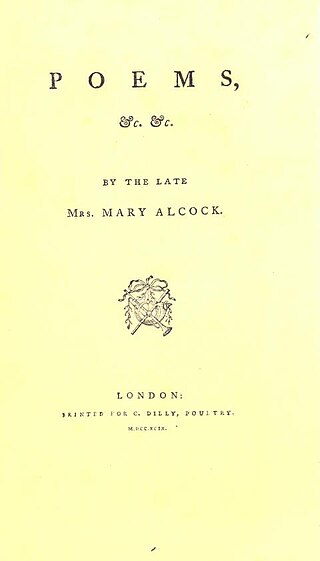
Mary Alcock was an English poet, essayist, and philanthropist. She was part of Lady Anne Miller's literary circle in Bath.
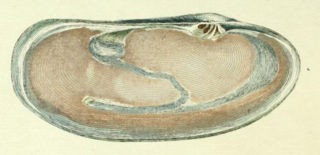
Elizabeth Frances Amherst, was an English poet and amateur naturalist. Although she remained largely unpublished during her own lifetime, she has engendered interest among twentieth- and twenty-first-century critics.
Nationality words link to articles with information on the nation's poetry or literature.
Nationality words link to articles with information on the nation's poetry or literature.
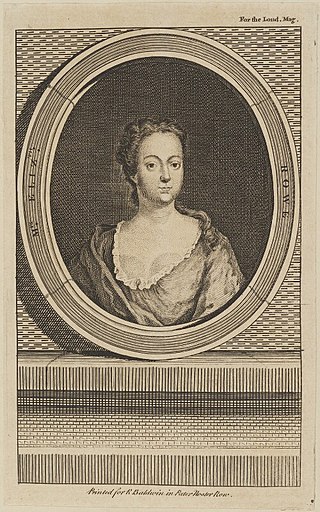
Elizabeth Singer Rowe was an English poet, essayist and fiction writer called "the ornament of her sex and age" and the "Heavenly Singer". She was among 18th-century England's most widely read authors. She wrote mainly religious poetry, but her best-known work, Friendship in Death (1728), is a series of imaginary letters from the dead to the living. Despite a posthumous reputation as a pious, bereaved recluse, Rowe corresponded widely and was involved in local concerns at Frome in her native Somerset. She remained popular into the 19th century on both sides of the Atlantic and in translation. Though little read today, scholars have called her stylistically and thematically radical for her time.

Mary Scott (1751/52–1793), married name Mary Taylor, was an English poet, born in Milborne Port, Somerset. She wrote The Female Advocate (1774) in defence of women writing.
Elizabeth Hands was an English poet.
Mary Darwall, who sometimes wrote as Harriett Airey, was an English poet and playwright. She belonged to the Shenstone Circle of writers gathered round William Shenstone in the English Midlands. She later explored subjects that included the nature of female friendship and the place of women writers.
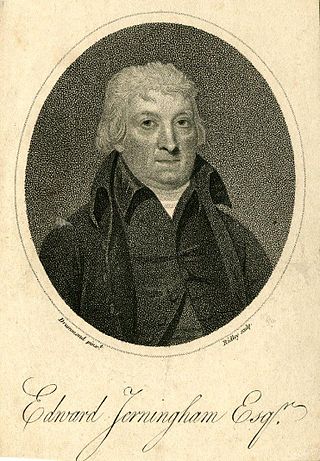
Edward Jerningham was a poet who moved in high society during the second half of the 18th century. Born at the family home of Costessey Park in 1737, he died in London on 17 November 1812. A writer of liberal views, he was savagely satirised later in life.
Lady Eliza Dorothea Tuite was an Irish author and poet. She was a member of the Anglo-Irish gentry, the distinguished Cobbe family.
Anne Penny was a British poet and translator, born in Wales to a vicar and his wife. She married a privateer who owned an estate in Oxford, but was left widowed at the age of 22 with a son, Hugh Cloberry Christian. She then started writing poetry. She married a French customs officer, again with a maritime history, and the couple moved to London. There she published a number of works, including her most significant poem An Invocation to the Genius of Britain, a patriotic piece written at the start of the Anglo-French War. She also published a number of translations of Welsh poems.

Esther Day was a British author and philanthropist.
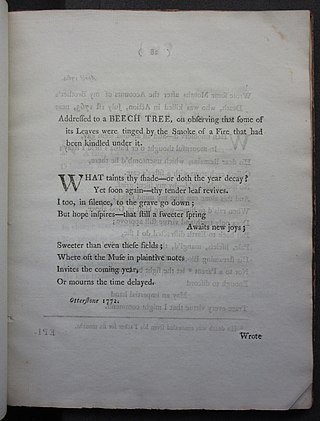
Christian Carstairs was a Scottish poet who published anonymously.
References
- ↑ Esther Lewis Clark in The Cambridge Companion to Women's Writing in Britain, 1660–1789, Cambridge Companions to Literature, Catherine Ingrassia ED, Cambridge University Press, (2015), pages xiv and 5 ISBN 131629823X
- 1 2 3 4 Ester Clark in The Wiley-Blackwell Encyclopedia of Eighteenth-Century Writers and Writing 1660 - 1789 Paul Baines, Julian Ferraro, Pat Rogers, page 67, pub John Wiley & Sons, 2010 ISBN 1444390082
- 1 2 3 Lonsdale, Roger (ed) (1990). Esther Lewis in Eighteenth Century Women Poets: An Oxford Anthology . Oxford University Press. page 225. ISBN 0192827758.